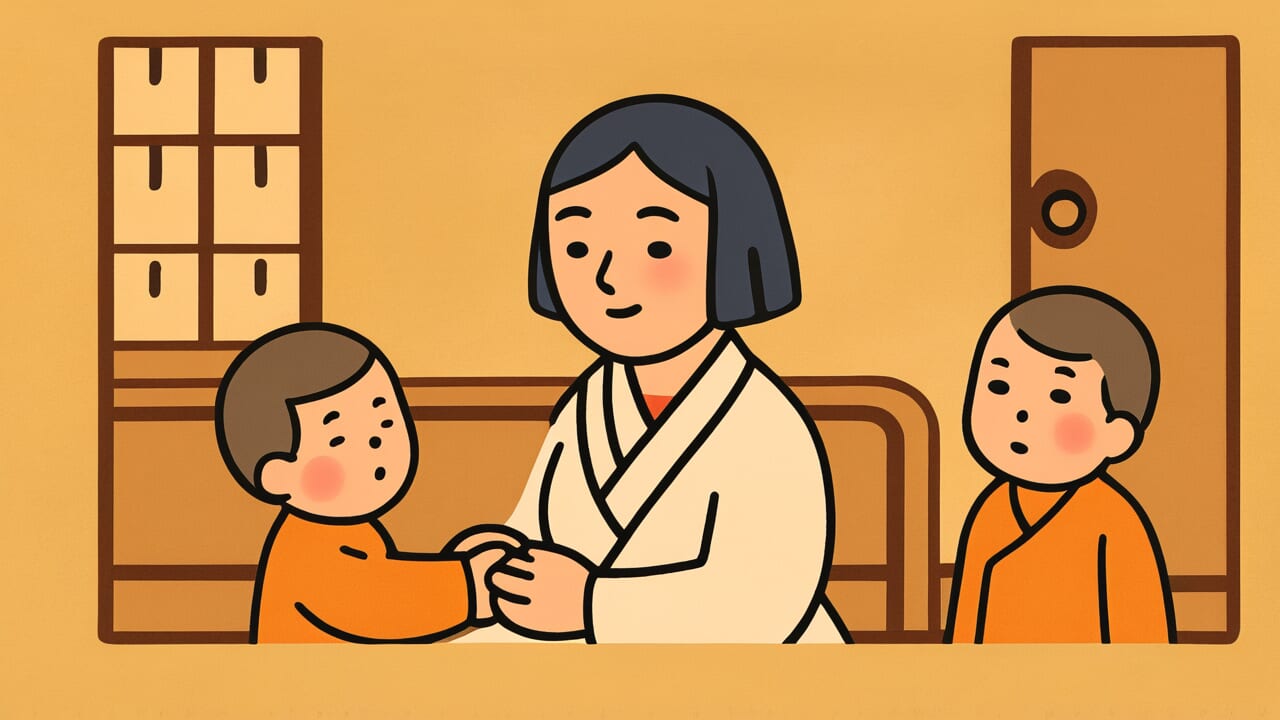How to Read “Filial piety declines with a wife and children”
Kō wa saishi ni otorou
Meaning of “Filial piety declines with a wife and children”
This proverb describes a common human tendency. When someone gets married and has children, their devotion to their parents often weakens.
A person who put their parents first when single may change after marriage. Once they have their own family, love and responsibility for their wife and children naturally take priority.
From morning to night, caring for a spouse and children fills their mind. There’s less time and mental space to think about parents back home.
This doesn’t come from bad intentions. It’s a natural expression of love for the family right in front of you.
But that’s exactly why this proverb serves as a warning. When you realize you haven’t visited home lately or checked on your parents, this saying reminds you to be more mindful.
Even today, people use this expression when thinking about parent-child relationships after marriage.
Origin and Etymology
The exact source of this proverb is unclear. However, it likely emerged from Japanese society deeply influenced by Confucian thought.
Confucianism places filial piety among the most important virtues. Caring for one’s parents is considered a fundamental moral duty.
The proverb contrasts two elements: filial piety and wife and children. The word “declines” is significant here.
It doesn’t mean filial piety disappears completely. Rather, it gradually weakens over time. The proverb isn’t condemning marriage but calmly observing a natural psychological shift.
Looking at common life in the Edo period helps us understand this better. Getting married and starting a family meant taking on new responsibilities.
Protecting a wife and raising children consumed daily time and attention. Caring for parents at home became harder than before. This was an unavoidable reality of human life.
The proverb expresses this movement of the human heart as a warning. It acknowledges natural emotional flow while teaching that we must consciously maintain devotion to parents.
Usage Examples
- My son rarely contacts me since he got married, but “filial piety declines with a wife and children,” so perhaps it can’t be helped
- “Filial piety declines with a wife and children” is so true—since starting my own family, I haven’t been attentive enough to my parents
Universal Wisdom
“Filial piety declines with a wife and children” reveals something essential about human love. Love isn’t infinite. It’s more like a limited resource.
The more deeply we love someone, the more time and emotional energy we pour into them. Loving a new family is wonderful.
But a day has only twenty-four hours. Our capacity for worry has limits too.
When you’re concerned about your wife’s health, watching your children grow, and worrying about household finances, attention to other things naturally fades.
This proverb has endured because the phenomenon is so universal. Across different eras and cultures, the same thing happens when people start families.
It’s a truth rooted in the very structure of the human heart.
Our ancestors recognized this unavoidable human nature. That’s why they taught that we must consciously maintain devotion to parents.
Because it naturally declines, we must sustain it through willpower.
Here lies the deep wisdom of this proverb. It acknowledges human weakness while showing a path to overcome it.
When AI Hears This
Viewing human emotional energy as a closed thermodynamic system reveals something interesting. Filial piety resembles “long-distance heat transport.”
In physics, heat transfer efficiency drops with distance. Parents are often distant, both physically and psychologically.
Meanwhile, a wife and children exist at “close range” in the same house. Energy always chooses the path of least resistance.
Using the same emotional energy, pouring it into nearby family members costs far less.
More important is the difference in feedback loop speed. Being kind to your wife and children brings smiles back within seconds.
This is immediate energy recovery—”high-efficiency heat exchange.” But filial piety has slow responses, sometimes no response at all.
As the second law of thermodynamics shows, systems naturally move toward increasing entropy. They drift toward less energy-efficient directions.
Filial piety, this “inefficient heat transport,” cannot be maintained without conscious effort.
The human brain consumes about 400 kilocalories daily—20 percent of the body’s 2000 kilocalorie budget. Emotional consideration operates within this energy budget.
When allocating limited resources between distant parents and nearby family, the brain unconsciously calculates “energy efficiency.”
This isn’t laziness. It’s biological optimization.
Lessons for Today
This proverb teaches modern people that important relationships require conscious effort to maintain. Love springs up naturally, but its distribution needs conscious control to stay balanced.
In modern society, the structure this proverb describes has become even more complex. Beyond wife and children, countless things demand our attention—work, friendships, hobbies, social media.
Caring for parents gets pushed aside even more easily now.
That’s why concrete action plans matter. Call home once a month. Take time once a week to think about how your parents are doing.
Small habits like these give you power to resist the natural flow of your heart.
Setting calendar reminders isn’t cold at all. It’s a wise response based on understanding human limitations.
Your heart is finite. That’s exactly why you must consciously and deliberately build in consideration for the people who truly matter.
This is wisdom for living in the modern world.
Let’s find creative ways to cherish both filial piety toward parents and love for wife and children. Both deserve your care.



Comments